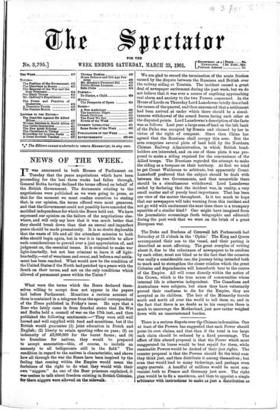We are glad to record the termination of the acute
friction caused by the dispute between the Russians and British over the railway siding at Tientsin. The incident caused a great deal of newspaper excitement during the past week, but we do not believe that it was ever a source of anything approaching real alarm and anxiety to the two Powers concerned. In the House of Lords on Thursday Lord Lansdowne briefly described the causes of the quarrel, and then announced that a settlement had been arrived at under which there ' should be a simul- taneous withdrawal of the armed forces facing each other at the disputed points. Lord Lansdowne's description of the facts was as follows. Last year a large area of land on the left bank of the Peiho was occupied by Russia and claimed by her in virtue of the right of conquest. Since then China has agreed that the Russians shall, occupy this area. But the area comprises several plots of land held by the Northern Chinese Railway Administration, in -which British bond- holders are interested, and on one of these plots it was pro- posed to make a siding required for the convenience of the Allied troops. The Russians regarded the attempt to make the siding as a trespass on their territory. At first we tried to get Count Waldersee to arbitrate, but apparently Count Lamsdorff preferred that the subject should be dealt with between the two Governments, and that meanwhile there should be a simultaneous withdrawal. Lord Lansdowne ended by declaring that the incident was, in reality, a very small matter and of purely local importance. That has been our view of the matter throughout. Is it too much to hope that our newspapers will take warning from this incident and not go wild with excitement the next time there is a trumpery squabble of a similar kind? One might have imagined from the journalistic screamings (both telegraphic and editorial) during the past week that we were on the brink of a great European war.






































